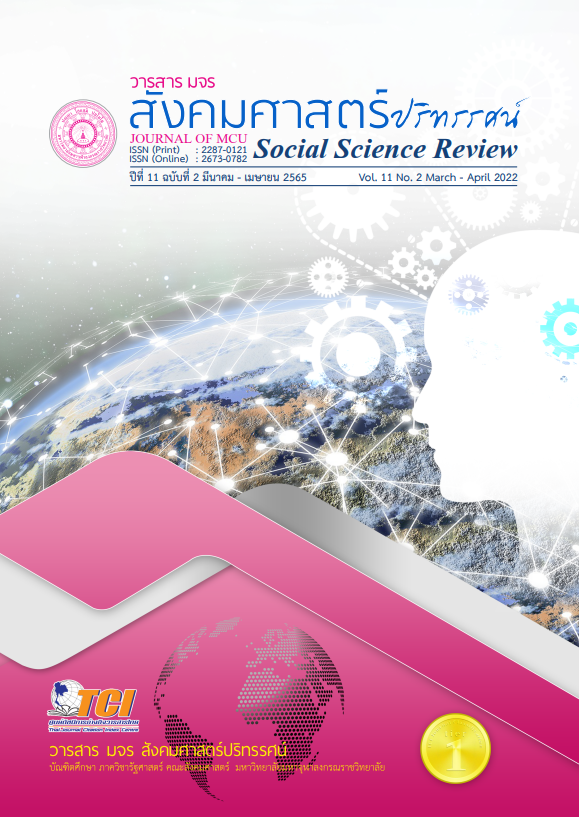ปัจจัยที่ส่งผลต่อประสิทธิผลของโรงเรียนวิถีพุทธพระราชทาน
คำสำคัญ:
ประสิทธิผล, โรงเรียนวิถีพุทธพระราชทาน, โรงเรียนวิถีพุทธบทคัดย่อ
บทความวิจัยนี้มีวัตถุประสงค์เพื่อศึกษาประสิทธิผลและวิเคราะห์ปัจจัยที่ส่งผล ซึ่งเก็บรวบรวมข้อมูลโดยใช้แบบสอบถาม กลุ่มตัวอย่าง ได้แก่ ผู้บริหาร รองผู้บริหาร ครูผู้ดูแลโครงการและครูผู้สอน จำนวน 566 คน จากทั้งหมด 75 โรงเรียน โดยวิธีการสุ่มตัวอย่างแบบเจาะจงและแบบง่าย การวิเคราะห์ข้อมูลโดยใช้สถิติเชิงบรรยายและการวิเคราะห์โครงสร้างความสัมพันธ์เชิงสาเหตุโดยใช้โปรแกรม LISREL
ผลการวิจัยพบว่า ประสิทธิผลในภาพรวมอยู่ในระดับมากที่สุด เมื่อพิจารณารายด้าน พบว่า ด้านที่มีค่าเฉลี่ยสูงสุด คือ ความเจริญงอกงามของนักเรียนและการยอมรับจากสังคมรองลงมาคือ คุณภาพการปฏิบัติงานและความพึงพอใจของผู้ร่วมงาน ตามลำดับ และปัจจัยที่ส่งผลต่อประสิทธิผลฯ สูงสุดจากปัจจัยด้านบริหาร รองลงมาคือ ปัจจัยด้านบุคลากร ปัจจัยภายนอก และปัจจัยด้านกายภาพสถานศึกษา ตามลำดับ ส่วนอิทธิพลทางอ้อมได้รับอิทธิพลสูงสุดจากปัจจัยด้านบริหาร รองลงมาคือ ปัจจัยด้านบุคลากร ปัจจัยภายนอก และปัจจัยด้านกายภาพสถานศึกษา ตามลำดับ มีอิทธิพลในทิศทางบวก ซึ่งผลการวิเคราะห์โมเดลความสัมพันธ์โครงสร้างเชิงเส้นมีความสอดคล้องกับข้อมูลเชิงประจักษ์ พบว่า ค่า Chi-Square: ( ) = 1694. 97, (P= 0.02) , df = 585, GFI = 0.96, RMSEA = 0.05, RMR = 0.032, CFI = 0.97, และ NFI = 0.96
เอกสารอ้างอิง
กระทรวงศึกษาธิการ. (2554). แนวทางการดำเนินงานโรงเรียนวิถีพุทธ. กรุงเทพฯ: อุษาการพิมพ์.
จุติพร จินาพันธ์. (2560). แรงจูงใจของครูที่ส่งผลต่อประสิทธิผลของโรงเรียนสังกัดสำนักงานเขตพื้นที่การศึกษามัธยมศึกษา เขต 18. วารสารศึกษาศาสตร์ปริทรรศน์, 28(2), 75-90.
นฤมล เจริญพรสกุล. (2559). ปัจจัยที่ส่งผลต่อประสิทธิผลของโรงเรียนประถมศึกษา สังกัดสำนักงานคณะกรรมการส่งเสริมการศึกษาเอกชน (ดุษฎีนิพนธ์ปริญญาครุศาสตรดุษฎีบัณฑิตสาขาวิชาบริหารการศึกษา). ปทุมธานี: มหาวิทยาลัยราชภัฎวไลยอลงกรณ์ในพระบรมราชูปถัมภ์.
นันท์นภัส วิกุล. (2560) . ประสิทธิผลของสถานศึกษาระดับปฐมวัย ในจังหวัดนครราชสีมา (ดุษฎีนิพนธ์ปรัชญาดุษฎีบัณฑิตสาขาบริหารการศึกษา). กรุงเทพฯ: มหาวิทยาลัยราชภัฎสวนสุนันทา.
พระพรหมบัณฑิต. (2556) . ทิศทางการศึกษาไทย. กรุงเทพฯ: โรงพิมพ์มหาจุฬาลงกรณราชวิทยาลัย.
พระมหาสุรศักดิ์ สุรสกฺโก. (2557). ปัจจัยที่มีผลต่อการบริหารโรงเรียนวิถีพุทธชั้นนำของสถานศึกษาขั้นพื้นฐานสังกัดสำนักงานเขตพื้นที่การศึกษานนทบุรี (ดุษฎีนิพนธ์พุทธศาสตรดุษฎีบัณฑิตสาขาพุทธบริหารการศึกษา). พระนครศรีอยุธยา: มหาวิทยาลัยมหาจุฬาลงกรณราชวิทยาลัย.
มหาวิทยาลัยมหาจุฬาลงกรณราชวิทยาลัย. (2563). การดำเนินงานโรงเรียนวิถีพุทธ. สืบค้น 14 พฤษภาคม 2564, จาก http://www.vitheebuddha.com/main
ฤทัยรัตน์ บุญอินทร์. (2559). ปัจจัยที่ส่งผลต่อประสิทธิผลของโรงเรียน สำนักงานเขตพื้นที่การศึกษาประถมศึกษาชลบุรี เขต 1 (วิทยานิพนธ์ศึกษาศาสตรมหาบัณฑิตสาขาบริหารการศึกษา). กรุงเทพฯ: มหาวิทยาลัยบูรพา.
สำนักงานคณะกรรมการศึกษาขั้นพื้นฐาน. (2563). ยุทธศาสตร์การพัฒนาโรงเรียนวิถีพุทธ. กรุงเทพฯ: อุษาการพิมพ์.
สำนักงานพัฒนานวัตกรรมการจัดการศึกษา. (2557). แนวทางดำเนินการ 29 ประการสู่ความเป็นโรงเรียนวิถีพุทธ. สืบค้น 29 มิถุนายน 2564, จาก http://vitheebuddha.com
Bollen. K. A. (1989). Structure equations with latent variables. New York: John Wiley & Sons.
Yamane, T. (1973). Statistics: An Introductory Analysis. New York: Harper & Row.
ดาวน์โหลด
เผยแพร่แล้ว
รูปแบบการอ้างอิง
ฉบับ
ประเภทบทความ
สัญญาอนุญาต
ลิขสิทธิ์ (c) 2022 วารสาร มจร สังคมศาสตร์ปริทรรศน์

อนุญาตภายใต้เงื่อนไข Creative Commons Attribution-NonCommercial-NoDerivatives 4.0 International License.
เพื่อให้เป็นไปตามกฎหมายลิขสิทธิ์ ผู้นิพนธ์ทุกท่านต้องลงลายมือชื่อในแบบฟอร์มใบมอบลิขสิทธิ์บทความให้แก่วารสารฯ พร้อมกับบทความต้นฉบับที่ได้แก้ไขครั้งสุดท้าย นอกจากนี้ ผู้นิพนธ์ทุกท่านต้องยืนยันว่าบทความต้นฉบับที่ส่งมาตีพิมพ์นั้น ได้ส่งมาตีพิมพ์เฉพาะในวารสาร มจร สังคมศาสตร์ปริทรรศน์ เพียงแห่งเดียวเท่านั้น หากมีการใช้ภาพหรือตารางหรือเนื้อหาอื่นๆ ของผู้นิพนธ์อื่นที่ปรากฏในสิ่งตีพิมพ์อื่นมาแล้ว ผู้นิพนธ์ต้องขออนุญาตเจ้าของลิขสิทธิ์ก่อน พร้อมทั้งแสดงหนังสือที่ได้รับการยินยอมต่อบรรณาธิการ ก่อนที่บทความจะได้รับการตีพิมพ์ หากไม่เป็นไปตามข้อกำหนดเบื้องต้น ทางวารสารจะถอดบทความของท่านออกโดยไม่มีข้อยกเว้นใดๆ ทั้งสิ้น





